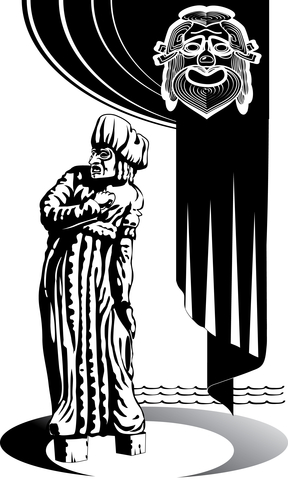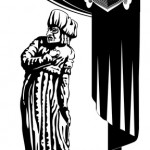The Action Off-Stage
I’m just now catching up on Season 2 of Downton Abbey. As always, Maggie Smith’s character, Violet Crawley, has me giggling in every episode. Last night’s viewing was no different, and with it she actually had a particularly choice comment that perfectly describes the importance of dreaming. Here’s the scene:
As chaos is brewing over the choice to move soldiers into Downton, the family agitates in the parlor over where they’ll be able to have some privacy. To this Crawley quips: “Oh I just hate Greek dramas!” To which all think she means she hates drama and chaos… maybe it’s not a good idea to move the soldiers in, after all. But to the family’s reaction Crawley screws up her face and says “You, know, where all the action happens off-stage!”
Violet Crawley loves action and drama, and in one funny line reminds us to keep it all front and center so she can watch and participate. I am Violet Crawley to my dreams.
Dreams are the action off-stage. As we go through our daily, waking lives our sensing body is picking up tremendous amounts of information – how we feel about this or that experience, what we’ve processed about it, and added information that we didn’t pick up that was available to us, but to which we weren’t present. That last little bit is sometimes hard for some people to grasp – how can there be information in an experience more than what you already got?
Here’s an example: Yesterday in my bi-monthly racquetball game my opponent told me a refinement to one of the game’s rules. I completely missed her next serve – my arm reached out for it, but my head didn’t follow because it was thinking about the rule. Later, I asked what time it was, and then my opponent missed my next serve for the same reason. If we’re not present to the game – e.g. if we are thinking about something else – we miss the action.
It is easy to extrapolate that same concept into a business meeting. Let’s say the boss is speaking about next year’s goals and mentions an expectation to produce more widgets. Suddenly, your mind is clenched into thinking: “With what time? How can I work longer hours? I’ll have to get a sitter to get my kids after school”, and so on. Meanwhile, during all that thinking – which is very loud in our internal ears – the boss has talked about the new hires that will relieve people of some of this work, and the potential for a bonus, all missed because of the thinking. In another example, remember a time when you’ve walked into an event focused on one person you have to meet – how many other people did you see? How much of the room did you take in? Do you remember what people wore, or what song was playing?
While our conscious mind is occupied with our thoughts, our sensing body is gathering information non-stop about the environments and experiences we are in and having. When we go to sleep at night our conscious mind quiets so that all of this sensing information can come to the fore. Dreams bring this information back to us with a coherence so that we get all the action that happened off-stage.
In the pyramids in Egypt there are stories written across the walls. But, only half of the story is written on one side of the wall… to get the rest of the story, you have to walk around to see the other side of the wall. This, too, is dreaming.
It’s fun to be Violet Crawley and be present and central to the action! Learning to pay attention to our dreams puts us right on stage with our Self and the life we are living. It’s getting the whole story, so that nothing happens offstage.

